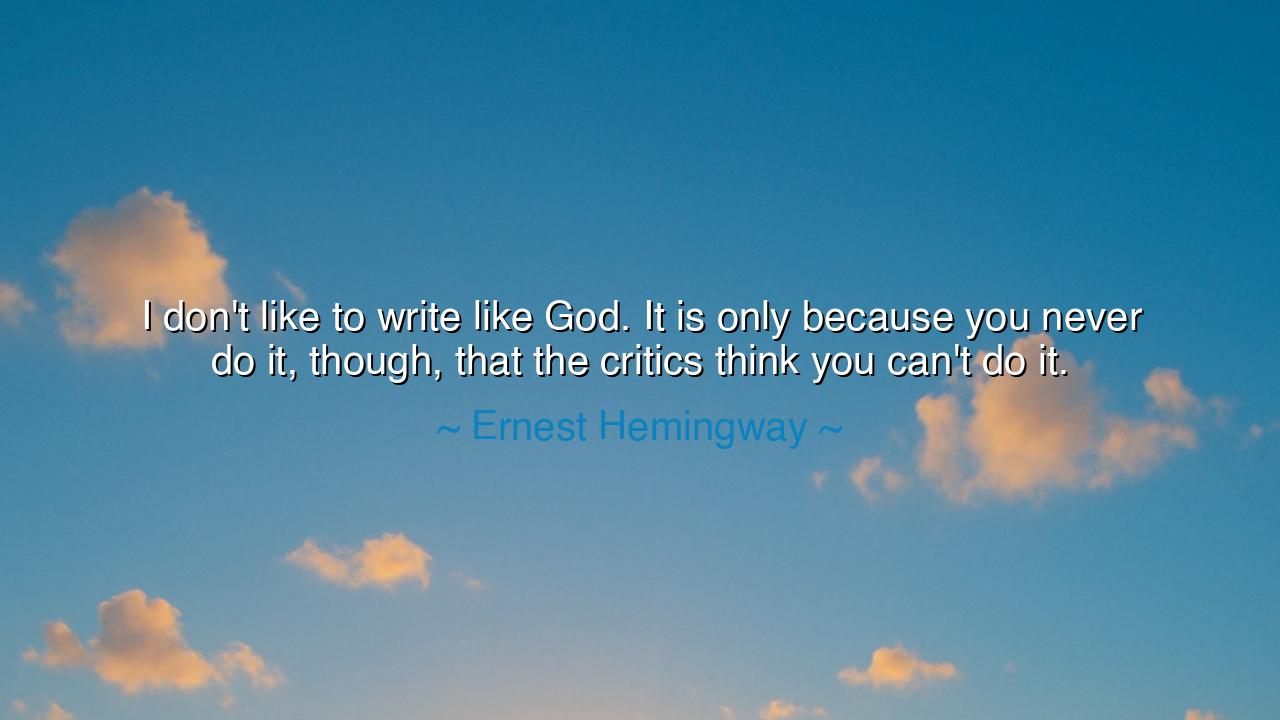
I don't like to write like God. It is only because you never do
I don't like to write like God. It is only because you never do it, though, that the critics think you can't do it.






“I don’t like to write like God. It is only because you never do it, though, that the critics think you can’t do it.” — thus spoke Ernest Hemingway, the warrior of words and prophet of simplicity, whose pen carved truth from silence and beauty from restraint. In this statement lies a revelation not merely about writing, but about the nature of mastery itself. Hemingway, who understood the art of saying little but meaning much, reminds us that power does not always roar; sometimes it whispers. He who can do a thing but chooses not to display it constantly possesses a deeper strength — the strength of discipline.
When Hemingway says he does not wish to “write like God,” he speaks not out of modesty, but of purpose. To “write like God” would be to indulge in grandeur, to adorn every line with the thunder of divinity and the flame of self-importance. But Hemingway sought truth, not vanity. He believed that the truest art was humble, stripped of excess, shaped like a blade — sharp, lean, and precise. And so he restrained his own genius, refusing to let brilliance become decoration. Yet, in his restraint, he achieved something holier: authenticity.
But the world, blinded by spectacle, often mistakes humility for limitation. Thus he laments that “the critics think you can’t do it.” The masses, who love loudness and flourish, cannot always see the majesty in quiet strength. They confuse simplicity with inability, just as the shallow mistake silence for emptiness. Hemingway’s words echo the eternal truth: the master need not prove himself. His power lies in the ease of his control — like a great swordsman who no longer needs to unsheathe his blade to command respect.
Consider the tale of Leonardo da Vinci, who painted fewer than twenty finished works in his lifetime, though his skill could have conquered every canvas in Italy. Why so few? Because Leonardo sought perfection in essence, not in number. He worked slowly, humbly, always questioning, always refining — while others painted endlessly to please the crowd. Many critics called him distracted, even lazy. Yet centuries later, his Mona Lisa still gazes from eternity, while the names of his critics have turned to dust. Like Hemingway, he did not strive to act “like God”; he sought instead to understand the divine through precision, through restraint.
There is a sacred wisdom in holding back. The river that floods its banks may seem mighty for a moment, but soon destroys what it touches; the river that flows within its channel nourishes life for generations. So too with art, leadership, or any act of creation — the strength to restrain is the mark of true mastery. The mediocre man exhausts himself in proving what he can do; the wise man does not need to. His power is evident in the quiet dignity of his choices, his confidence in his craft, his patience with time.
In this, Hemingway’s quote becomes a lesson for all who labor in any form of creation — not only writers, but dreamers, builders, and thinkers. Do not let the noise of the world push you toward vanity. Let your work speak softly, but with truth. Know your power, but do not flaunt it. Know your gift, but do not worship it. If others doubt you because you do not shout your brilliance, let them. The oak does not explain its height to the weeds; it simply grows toward the light.
The path of greatness, then, is not to act “like God,” but to act with God — with steadiness, with humility, with devotion to the craft rather than to applause. The critics may never understand the quiet worker, the one who labors not for recognition but for meaning. Yet history remembers such souls long after the voices of the loud and proud fade into silence. Hemingway’s restraint became his power, his humility became his legend, and his simplicity became his immortality.
And so, let this be your teaching: Mastery is not in showing all that you can do, but in choosing what you must do. Let your work be clean, true, and alive. Let your greatness flow beneath the surface, like a current of deep water. For when you can do the impossible and yet choose simplicity, the world will one day see — perhaps too late — that you were never less than divine in your craft. Do not write like God. Live like one — in quiet strength, in steady creation, and in eternal truth.






AAdministratorAdministrator
Welcome, honored guests. Please leave a comment, we will respond soon